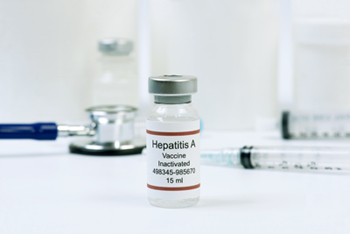Hong Kong health officials are alerting the public to an increase in hepatitis A cases since October 1. Since that time, 14 cases have been reported, while the previous none months saw just 1-5 cases per month.

Image/National Institute of Diabetes and Digestive and Kidney Diseases
The 14 cases recorded from October 1 to yesterday affected eight males and six females with ages ranging from 9 to 54, with a median age of 24.5. While four cases were imported from Pakistan, another three cases also affected Pakistanis (one local case and two cases with place of infection undetermined). The remaining seven cases included five local cases, one imported case from Bangladesh and one case with place of infection undetermined. All cases required hospitalization and were in a stable condition.
“Our epidemiological investigations so far have not identified a common food or water source among these cases. There was also no epidemiological linkage identified among them. The Centre for Health Protection (CHP) investigations are ongoing. We will continue to closely monitor the situation,” a CHP spokesman said.
“Hepatitis A is a liver disease caused by the hepatitis A virus (HAV). It is clinically characterized by fever, malaise, loss of appetite, diarrhea, nausea, abdominal discomfort and jaundice (yellowing discoloration of the skin and sclera of the eyes, dark urine and pale stool). Adults have signs and symptoms of illness more often than children, and the severity of disease increases in older age groups. Recovery from symptoms following infection may be slow and may take several weeks or months,” the spokesman explained.
Talking Hepatitis A with Dr Amesh Adalja
HAV is transmitted primarily by the fecal-oral route, that is when an uninfected person contacts or ingests objects, food or water that has been contaminated with the feces of an infected person. HAV can also be transmitted by eating contaminated food (especially shellfish) without thorough cooking and drinking contaminated drinks.
Hepatitis A vaccine is safe and effective in preventing the infection.
- Michigan reports 15 measles cases in 2018, Highest number since 1994
- Infectious disease news: Top 5 posts for the week Nov. 3- Nov. 9
- Mayaro virus: Penn State researchers suggest spread into other areas of the world
- Naegleria fowleri death reported in California
- Ebola: Uganda begins vaccinating frontline health workers
- Gonorrhea: Oregon State University researchers closer to a vaccine

